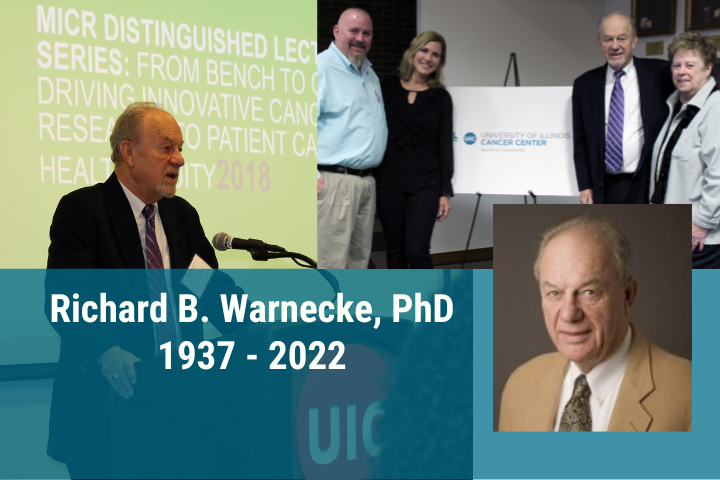
Richard B. Warnecke, a longtime member of the University of Illinois Cancer Center and a national leader in cancer control research, died Friday, Aug. 19. He was 84.
For more than 40 years, Warnecke, PhD, conducted research and community outreach that provided immeasurable service to women with cancer. Long before “health disparities” became a category of research among federal and nonprofit funding agencies, Warnecke was committed to this mission. His effort was in addressing inequities in health outcomes, going well beyond simply identifying risk factors. He worked to develop and implement interventions that made a difference in so many women’s lives.
Early in his career, Warnecke’s research centered on the cancer information needs in Illinois, data systems, and cancer surveillance methods that strongly influenced the creation of the state cancer registry in the mid-1980s – a vitally important resource to both practitioners and researchers and key to helping monitor its progress in reducing cancer’s toll. Warnecke next turned his attention to the considerable problem of smoking among low-educated women, given that more women die from lung cancer than from any other cancer. With a collaborative group of multidisciplinary investigators, Warnecke led a team to develop a set of novel approaches to help women stop smoking.
Warnecke, professor emeritus of epidemiology, public administration and sociology at the University of Illinois Chicago, sustained a continuous and high level of funding from the National Cancer Institute (NCI). He was particularly skillful in conducting large-scale, multiple-component, community-based investigations, consisting of two program projects – Community Interventions for Cancer Prevention (1986-1992) and Strategies for Smoking Cessation Among Low Educated Women (1993-1998).
As director of the Health Policy Center, Institute for Health Research and Policy, and Associate Director for Population Health he led three center grants – the Center for Population Health and Health Disparities (2003-2015) and the Center for Excellence in Eliminating Health Disparities (2009-2015). Warnecke graciously served on UI Cancer Center’s NCI ChicagoCHEC (Chicago Cancer Health Equity Collaborative) Internal Advisory Committee and on the ACS-Illinois Cancer Health Equity Research Center grant’s Community Advisory Board.
Utilizing the two Center grants, Warnecke’s team of researchers worked to better understand why Black women with breast cancer are more likely than their white counterparts to be diagnosed with late-stage, high-grade disease and more aggressive subtypes of breast cancer. The investigations examined multiple potential levels of influence on these disparities, including neighborhood health resources, level of neighborhood social integration and support, and whether patient navigators can improve the timing and quality of treatment of poor women with breast cancer. Warnecke and his colleagues also conducted genetic analyses to help understand these disparities between Black and white women in disease stage and outcomes.
In his distinguished career Warnecke published more than 100 peer-reviewed scientific papers along with several book chapters, and garnered more than $40 million in NIH funding focused on addressing health disparities. He made a special effort to recruit and mentor junior investigators from underrepresented minority groups. In 1992, he began a federally funded Cancer Education and Career Development training program for doctoral students and postdoctoral fellows in multidisciplinary cancer control and prevention research, now in its 30th year. He was influential in launching the careers of many researchers who followed in his footsteps to address health disparities.
Although he officially became emeritus in 2007, Warnecke remained actively involved in his pursuit of cancer prevention, and he was continually pursuing innovative research ideas to help improve the lives of those at-risk.
Warnecke, who served as associate director of the Cancer Center’s Population Sciences, Cancer Control and Education program, was the recipient of numerous accolades. Among the awards was a gift he received from former Cancer Center Director Robert Winn, MD, at an event at UIC sponsored by the American Association for Cancer Research Minorities in Cancer Research annual meeting in 2018. The award recognized Warnecke’s tireless work in cancer disparities research.
Warnecke’s legacy will live on through the countless lives saved due to his work and the hundreds of students, trainees, faculty and staff who have been touched by his experience, mentoring, wisdom and generosity of heart.
Services will be held at First Presbyterian Church of Evanston, 1427 Chicago Avenue, Evanston, Ill., on Sept. 10, 2022 at 4 p.m. A reception will follow the service; all are welcome.
If you would like to make a donation ‘in memory of Dr. Richard B. Warnecke,’ please do so here.
